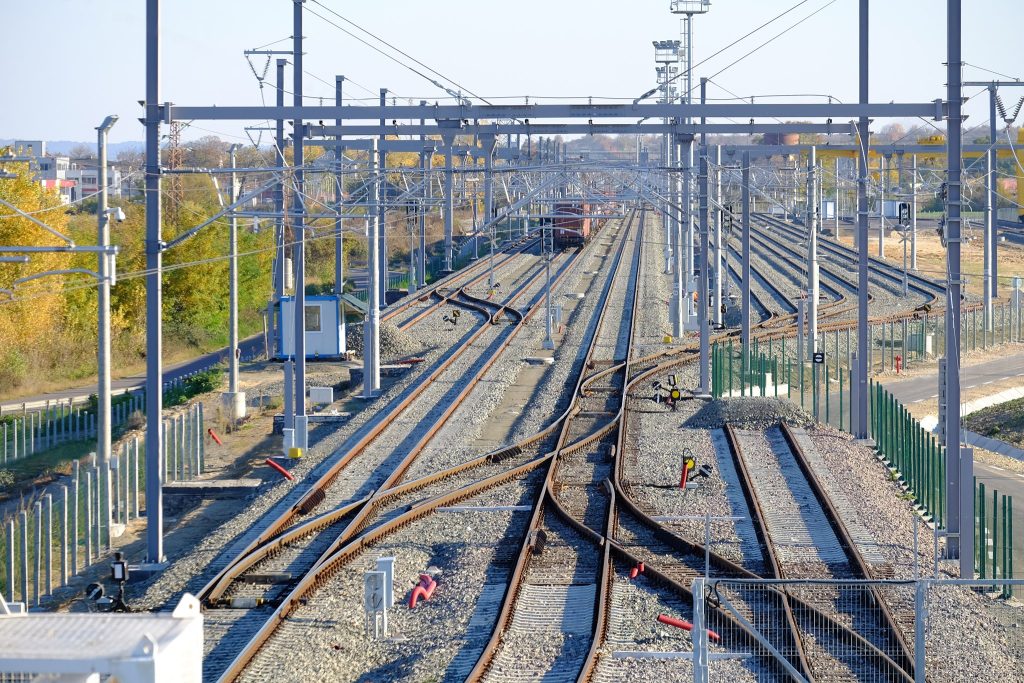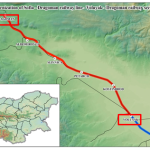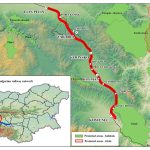 The European Commission has adopted the Transport Connectivity Programme, the first Bulgarian major infrastructure programme for the period 2021-2027.
The European Commission has adopted the Transport Connectivity Programme, the first Bulgarian major infrastructure programme for the period 2021-2027.
The EU has allocated EUR 1.61 billion, one of the largest amount for Bulgarian cohesion programmes in the programming period 2021 – 2027.
The main tasks defined in the programme is the timely completion of the TEN-T network and the digital transformation and includes the increasing attractiveness of rail passenger and freight transport to ensure the modal shift by improving the quality of the railway infrastructure as well as the eliminating bottlenecks on road infrastructure. It is also focused on the development of intelligent transport systems and the implementation of innovative solutions for stable, intelligent, secure and intermodal TEN-T in correspondence to the goals of national transport policy and the European Semester recommendations.
The funds will be directed to the largest and most important transport projects in Bulgaria and will also support the procurement of specialised equipment to reduce the emissions.
In the railway sector, the programme includes the construction and upgrade of the railway lines along the Orient/Eastern-Mediterranean corridor including the modernisation of the sections from Sofia to the Serbian and North Macedonia borders. Recently, the Deputy Minister of Transport and Communications Krasimir Papukchiyski has announced that Bulgaria will assist North Macedonia to build and modernise its rail infrastructure on the Corridor VIII which will increase rail freight capacity from the ports of Varna and Burgas through North Macedonia to Durres towards Europe.
The modernisation of Sofia – Pernik – Radomir line and the completion of Elin Pelin – Kostenets and Voluyak – Dragoman railway lines are among the targeted projects. Funding will be sought for their implementation, both under the Transport Connectivity Programme and under the Connecting Europe Facility.
Sofia – Pernik – Radomir railway line will provide connection towards North Macedonia through Gyueshevo (at the border). In 2015, the rail infrastructure manager NRIC awarded a consortium lead by NET Engineering to develop the design work for the modernisation of the line estimated at EUR 400 million. At the end of 2020, NRIC published the tender for construction works on two lots with the first covering the modernisation of the infrastructure, contact line and facilities on the Pernik – Radomir section. The Lot 2 included the design, construction and supervision of signalling and telecommunications systems along the same section. The tender is estimated at BGN 267.5 million (EUR 136.8 million).
The contract for Lot 1 covers the moderisation and track development including contact network at Pernik, Batanovtsi and Radomir stations, the construction of an electrified bypass at Batanovtsi station and the construction of three separate stations providing connections to Batanovtsi station and Rimenna station, the construction of a new overhead contact line, and the upgrade of SCADA system. BGN 236.4 million (EUR 120.9 million) is the value of the contract for this lot.
Lot 2 covers the design – including designer supervision – and construction of new Route Computer Internations (CCIs) for the stations in Pernik, Batanovtsi and Radomir covering the renewal of signalling and control-command facilities, the design and construction of new telecommunications systems and the replacement of track circuits and insulated units in stations with axle counters. BGN 31 million (EUR 15.9 million) is the value of this lot which should ensure the security of trains running at speeds of up to 160 km/h.
The project has also been co-financed by the Transport Operational Programme 2014-2020.
Elin Pelin – Kostenets is part of the Sofia – Plovdiv main line on the Orient/Eastern-Mediterranean corridor. The modernisation of this 51 km rail section will cut the travel time between the two cities in under 80 minutes with trains running at speeds of up to 160 km/h.
The modernisation of Elin Pelin – Kostenets runs in parallel with the modernisation of the 24.5 km Kostenets – Septemvri section, a major bottleneck on the line, which has been funded by the CEF.
EUR 665.3 million was the total investment for the modernisation of Sofia – Plovdiv line: Elin Pelin – Kostenets section in 2014-2020. Through the Cohesion Fund, EUR 471.5 million was provided under the Transport and Transport Infrastructure OP.
Under the CEF 2014-2020, EUR 57.8 million has been provided for design work on Sofia – Elin Pelin line modernisation.
In 2021 the authorities launched the construction of a 7 km twin tunnel on the 20 km Elin Pelin – Vakarel section, the most difficult rail section along the Sofia – Plovdiv line. The modernisation of this section worth almost BGN 500 million (EUR 255 million).
The Pelin – Kostenets modernisation, implemented on several sections, also includes two other projects totalling BGN 612.4 million (EUR 313 million).
The modernisation of the 34 km Voluyak – Dragoman line which provides connection with Serbia is divided into two sections from Volujak to Dragoman and from Sofia to Volujak which has received EUR 76 million CEF funding of its EUR 104.2 million eligible costs. The entire project covers track reconstruction, the construction of the second track, the construction of the contact line as well as the introduction of new signalling and telecommunication equipment.
In July, the EC has provided a EUR 110 million co-financing from the Cohesion Fund for the implementation of the project following the construction contract signing. The construction work for the first phase is expected to be completed in 2023. As expected, the implementation of the second phase – covering the ERTMS deployment – is to be realised through the EU 2021-2027 financing period.
The infrastructure programme is focused on environmentally friendly modes of transport and alternative fuels and covers the improvement of Bulgaria’s railway, road and maritime transport infrastructure to reduce the harmful impact of transport on the environment. The projects to be implemented are also targeted to achieve the EU Danube Region strategy.
“Bulgaria will receive support to further develop its transport system in a sustainable and greener manner. This will encourage the territorial, economic and social cohesion in the Bulgarian regions,” Elisa Ferreira the European Commissioner for Regional Policy said.
Bulgaria is implementing its transport projects, focused on the improvement and digitalisation of rail transport through the European funds including the availability of the 2014-2020 ERDF and Cohesion Fund, its recovery and resilience plan. In addition, under the first call of the CEF 2 Bulgaria will benefit a EUR 224.57 million co-financing for the modernisation of a rail section on the Vidin – Sofia railway line.
Share on:









